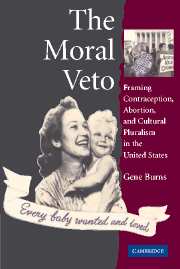Book contents
- Frontmatter
- Contents
- Acknowledgments
- 1 Introduction
- 2 Framing Contraception within Moral Worldviews: The Early, Radical Birth Control Movement
- 3 The Mainstreaming of Birth Control: A New Alliance with Eugenics and Medicine
- Dennett's Moral Worldview and the Catholic Moral Veto: Unsuccessful Frames for Contraception
- 5 Abortion before Controversy: Quiet Reform within a Medical, Humanitarian Frame
- 6 Abortion and Legislative Stalemate: The Weakness and Strength of the Medical, Humanitarian Frame
- 7 Looking Back: Limiting Frames, Moral Vetoes, and Cultural Pluralism
- Works Cited
- Index
6 - Abortion and Legislative Stalemate: The Weakness and Strength of the Medical, Humanitarian Frame
Published online by Cambridge University Press: 21 July 2009
- Frontmatter
- Contents
- Acknowledgments
- 1 Introduction
- 2 Framing Contraception within Moral Worldviews: The Early, Radical Birth Control Movement
- 3 The Mainstreaming of Birth Control: A New Alliance with Eugenics and Medicine
- Dennett's Moral Worldview and the Catholic Moral Veto: Unsuccessful Frames for Contraception
- 5 Abortion before Controversy: Quiet Reform within a Medical, Humanitarian Frame
- 6 Abortion and Legislative Stalemate: The Weakness and Strength of the Medical, Humanitarian Frame
- 7 Looking Back: Limiting Frames, Moral Vetoes, and Cultural Pluralism
- Works Cited
- Index
Summary
Introduction
In the case of both contraception and abortion, framing the issue in terms of a doctor's need to make medical decisions free from interference was central to the liberalization of legal restrictions. But we shall see in this chapter that such a medical frame does not easily win in a struggle against politicized frames that base themselves explicitly in a moral worldview and thus widen the agenda. The moral worldviews that had framed contraception declined as the social movements that spawned them declined. Liberalization of contraception had entered the public stage as a cause intertwined with broad agendas for social change; it became associated with respectable medicine only with great effort, and only once those causes lost their steam. Abortion reform had the advantage that it began among quiet circles of elites; but once discussion moves beyond such circles, frames based explicitly in moral worldviews are much more likely to emerge. The worldviews themselves rarely make much legislative progress but instead are more likely to take the form of moral vetoes, preventing any new statutory developments.
As we saw in the previous chapter, in the late 1960s, there emerged a movement for abortion reform, that is, liberalization of abortion laws to allow physicians wider discretion to grant legal abortions, most notably when physicians judged the physical or mental health of the pregnant woman, or deformity of the fetus, to be a significant risk.
- Type
- Chapter
- Information
- The Moral VetoFraming Contraception, Abortion, and Cultural Pluralism in the United States, pp. 207 - 243Publisher: Cambridge University PressPrint publication year: 2005



